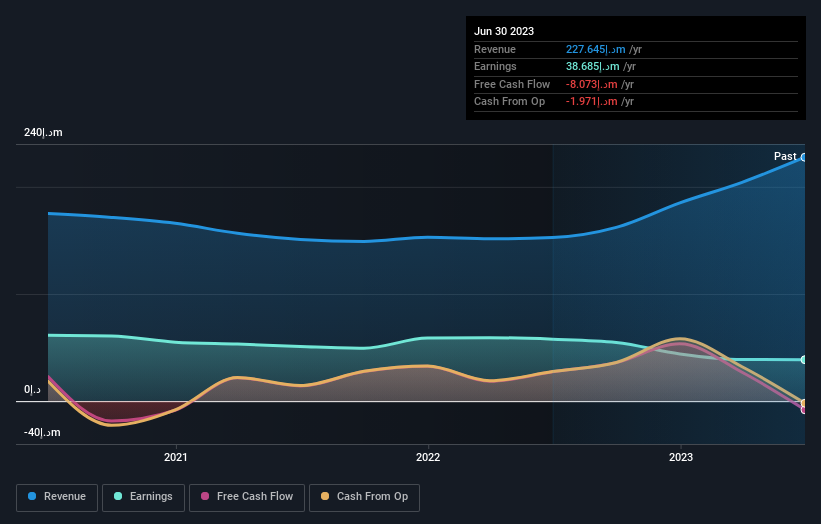Stock Analysis
- United Arab Emirates
- /
- Insurance
- /
- DFM:DNIR
Pulling back 12% this week, Dubai National Insurance & Reinsurance (P.S.C.)'s DFM:DNIR) five-year decline in earnings may be coming into investors focus

While Dubai National Insurance & Reinsurance Co. (P.S.C.) (DFM:DNIR) shareholders are probably generally happy, the stock hasn't had particularly good run recently, with the share price falling 13% in the last quarter. But at least the stock is up over the last five years. In that time, it is up 36%, which isn't bad, but is below the market return of 58%. While the long term returns are impressive, we do have some sympathy for those who bought more recently, given the 28% drop, in the last year.
Since the long term performance has been good but there's been a recent pullback of 12%, let's check if the fundamentals match the share price.
View our latest analysis for Dubai National Insurance & Reinsurance (P.S.C.)
There is no denying that markets are sometimes efficient, but prices do not always reflect underlying business performance. One way to examine how market sentiment has changed over time is to look at the interaction between a company's share price and its earnings per share (EPS).
During five years of share price growth, Dubai National Insurance & Reinsurance (P.S.C.) actually saw its EPS drop 6.5% per year.
Essentially, it doesn't seem likely that investors are focused on EPS. Because earnings per share don't seem to match up with the share price, we'll take a look at other metrics instead.
The revenue growth of 0.6% per year hardly seems impressive. So why is the share price up? It's not immediately obvious to us, but a closer look at the company's progress over time might yield answers.
You can see below how earnings and revenue have changed over time (discover the exact values by clicking on the image).

You can see how its balance sheet has strengthened (or weakened) over time in this free interactive graphic.
What About Dividends?
It is important to consider the total shareholder return, as well as the share price return, for any given stock. Whereas the share price return only reflects the change in the share price, the TSR includes the value of dividends (assuming they were reinvested) and the benefit of any discounted capital raising or spin-off. So for companies that pay a generous dividend, the TSR is often a lot higher than the share price return. As it happens, Dubai National Insurance & Reinsurance (P.S.C.)'s TSR for the last 5 years was 103%, which exceeds the share price return mentioned earlier. The dividends paid by the company have thusly boosted the total shareholder return.
A Different Perspective
While the broader market lost about 1.2% in the twelve months, Dubai National Insurance & Reinsurance (P.S.C.) shareholders did even worse, losing 26% (even including dividends). Having said that, it's inevitable that some stocks will be oversold in a falling market. The key is to keep your eyes on the fundamental developments. On the bright side, long term shareholders have made money, with a gain of 15% per year over half a decade. If the fundamental data continues to indicate long term sustainable growth, the current sell-off could be an opportunity worth considering. I find it very interesting to look at share price over the long term as a proxy for business performance. But to truly gain insight, we need to consider other information, too. For example, we've discovered 4 warning signs for Dubai National Insurance & Reinsurance (P.S.C.) (2 don't sit too well with us!) that you should be aware of before investing here.
If you are like me, then you will not want to miss this free list of growing companies that insiders are buying.
Please note, the market returns quoted in this article reflect the market weighted average returns of stocks that currently trade on Emirian exchanges.
Valuation is complex, but we're helping make it simple.
Find out whether Dubai National Insurance & Reinsurance (P.S.C.) is potentially over or undervalued by checking out our comprehensive analysis, which includes fair value estimates, risks and warnings, dividends, insider transactions and financial health.
View the Free AnalysisHave feedback on this article? Concerned about the content? Get in touch with us directly. Alternatively, email editorial-team (at) simplywallst.com.
This article by Simply Wall St is general in nature. We provide commentary based on historical data and analyst forecasts only using an unbiased methodology and our articles are not intended to be financial advice. It does not constitute a recommendation to buy or sell any stock, and does not take account of your objectives, or your financial situation. We aim to bring you long-term focused analysis driven by fundamental data. Note that our analysis may not factor in the latest price-sensitive company announcements or qualitative material. Simply Wall St has no position in any stocks mentioned.
About DFM:DNIR
Dubai National Insurance & Reinsurance (P.S.C.)
Dubai National Insurance & Reinsurance Co.
Flawless balance sheet with acceptable track record.

